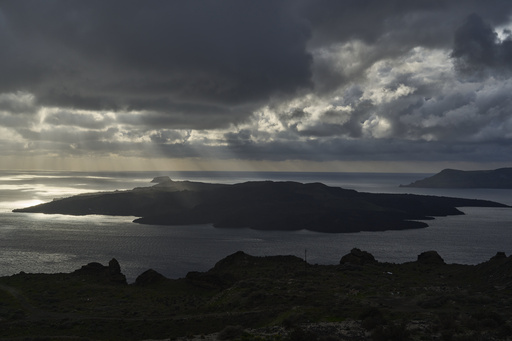
SANTORINI, Greece — The Aegean Sea has been experiencing a notable surge of seismic activity, referred to as a “seismic swarm.” This phenomenon has prompted discussions among officials about its potential duration and effects, as reported by the mayor of Santorini. Mayor Nikos Zorzos humorously remarked on the ongoing tremors while new ones continued to rattle items on his desk.
Zorzos explained that the swarm of earthquakes, which has seen magnitudes reach up to 5, may result in further small quakes or a more substantial singular quake, followed by an eventual tapering off of activity. He expressed cautious optimism after consulting with seismologists, who characterized the events as a series of clustered tremors with little significant variation in magnitude.
As the seismic activity persists, many residents and seasonal workers have opted to leave the Cycladic Islands, leading ferry and commercial airlines to increase their services to facilitate departures. In response to the situation, some Greek islands announced the closure of schools on Tuesday, prioritizing safety amidst the unrest. Ironically, a few adventurous tourists remain on the island, taking advantage of the quieter atmosphere and stunning vistas.
In light of the earthquakes, Santorini has taken precautionary measures including canceling public events, imposing travel restrictions, and temporarily halting construction in certain areas. Although the tremors have caused minor damage like cracks in older buildings, no injuries have been reported thus far.
Efthimios Lekkas, who leads the Earthquake Planning and Protection Organization, stated that the earthquake epicenter appears to be gradually shifting northwards, away from Santorini. He further noted that there is no correlation between the seismic activity and the area’s dormant volcanic systems. Lekkas conveyed uncertainty about the timeline of the ongoing events, indicating that they could persist for days or weeks.
In the primary town of Fira, usually bustling with tourists, the typically lively narrow streets along the cliffs seem unusually deserted for this time of year, with only a few small groups remaining, predominantly from Asian countries. Joseph Liu from Guangzhou, China, shared his excitement about visiting Santorini after years of admiration from afar, adding that the tour guide had kept guests informed about the earthquakes prior to their arrival, thereby alleviating any surprise.
Long-time resident Panagiotis Hatzigeorgiou, a retired police officer and ship worker, expressed his preference to remain on the island despite offers to stay with family in Athens. Hatzigeorgiou commented on how seasoned residents are generally accustomed to intermittent earthquakes but acknowledged that the frequency in this instance feels different. He emphasized the importance of remaining calm and even humorously noted the silver lining to fewer tourists: “Now we can listen to music alone and have coffee by ourselves.”

